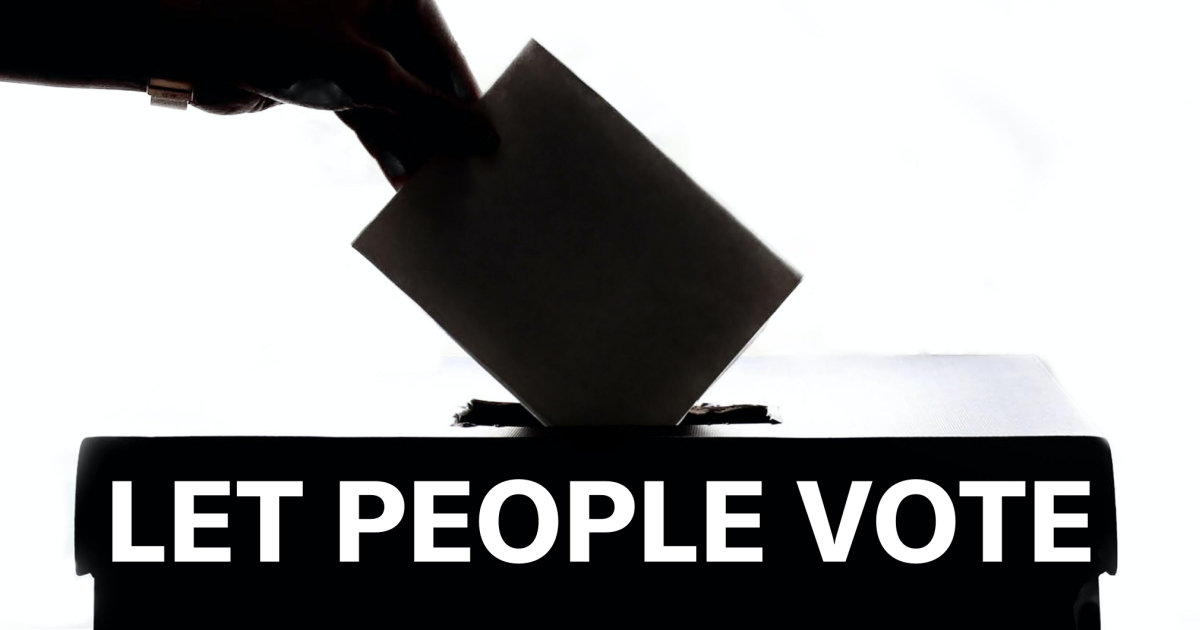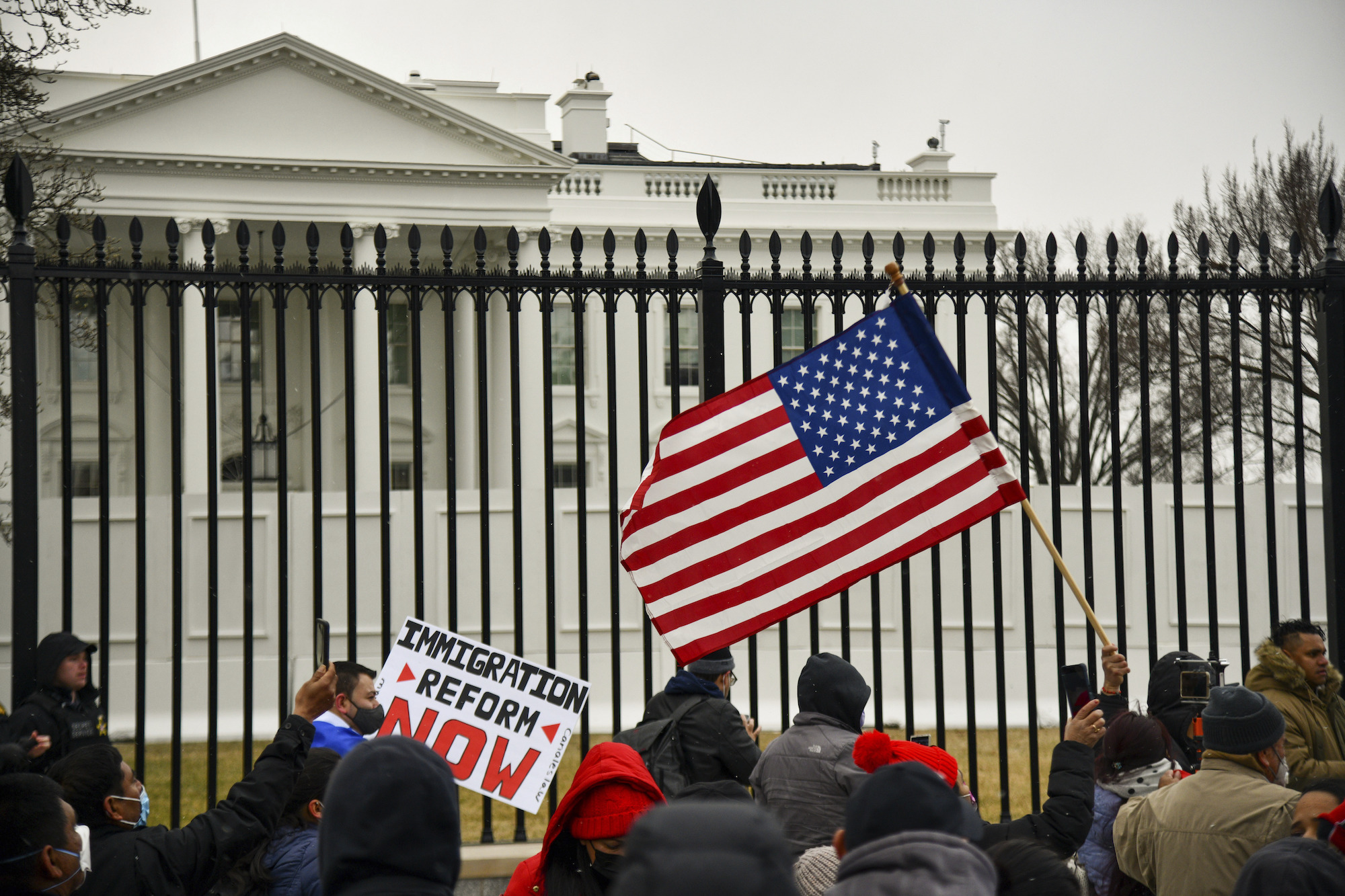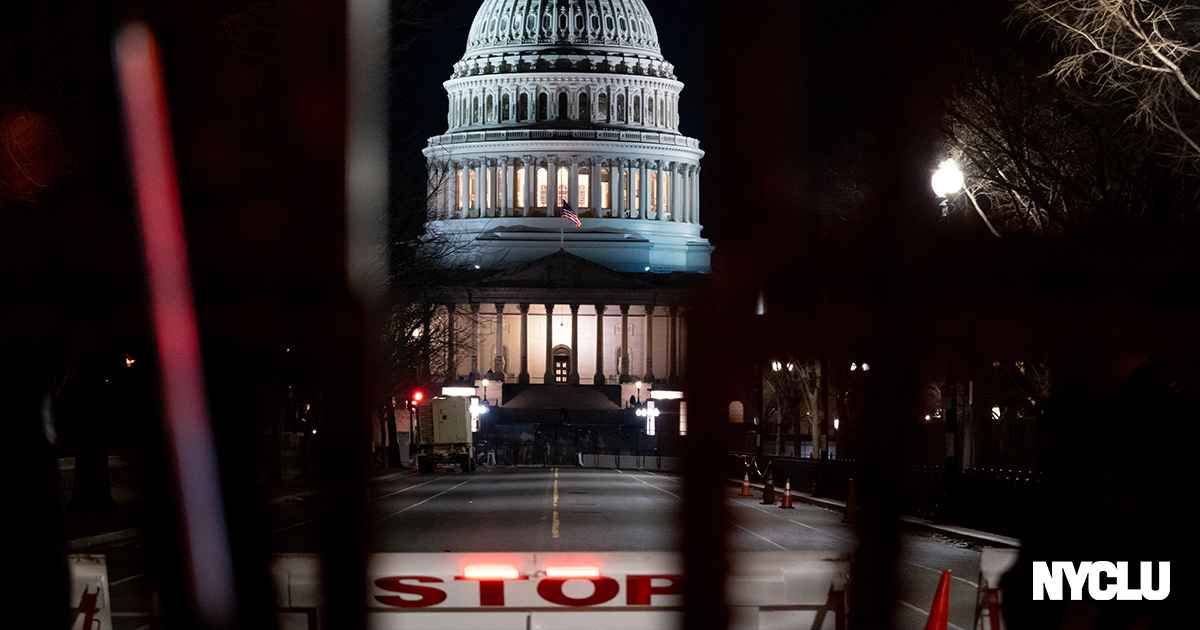Friday 31 March 2023
Ukraine: Request for an Extended Arrangement Under the Extended Fund Facility and Review of Program Monitoring with Board Involvement-Press Release; Staff Report; and Statement by the Executive Director for Ukraine
Published March 31, 2023 at 07:00AM
Read more at imf.org
ACLU: How the ACLU is Showing Up For Abortion Access Nationwide
Across the country, the ACLU, allied organizations, volunteers, and organizers are mobilizing together in the ongoing battle for our reproductive freedom and bodily autonomy — regardless of which state we call home. When anti-abortion extremists attempt to enforce bans on abortion, we show up. When they prioritize abortion bans over legislation that would actually improve their constituents’ lives, we show up. When overzealous prosecutors go after health care providers and patients seeking abortion care, we show up. When it’s time to make our voices heard in the ballot box and the streets, we show up.
Here are some of the ways we’ve shown up to protect abortion access in states across the country.
Michigan
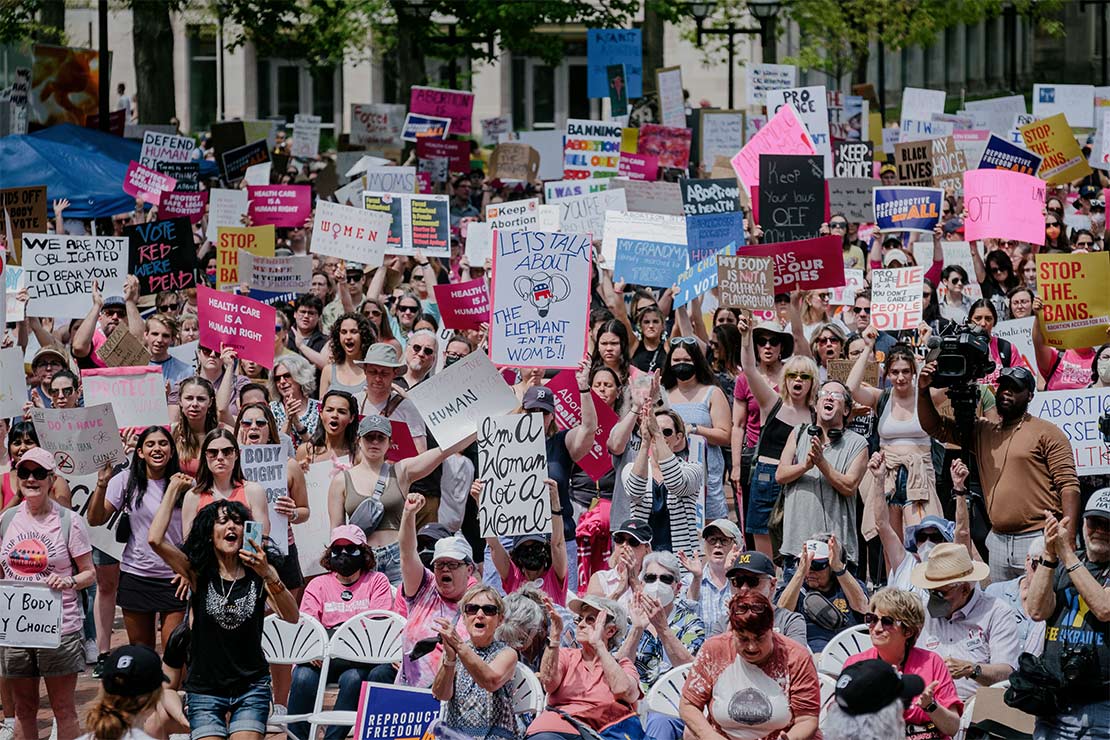
ACLU / Erin Kirkland
In Michigan, with coalition partners, the ACLU of Michigan co-led the fight to enshrine the right to reproductive freedom, including abortion, prenatal care, birth control, and all decisions regarding reproductive health, in the state constitution last November. Building on that historic win, our affiliate supported the repeal of an abortion ban from 1931 that threatened access to care after Roe v. Wade was overturned. The bill to repeal the 92-year-old law is now before Michigan Gov. Gretchen Whitmer, who is expected to sign it soon.
Virginia
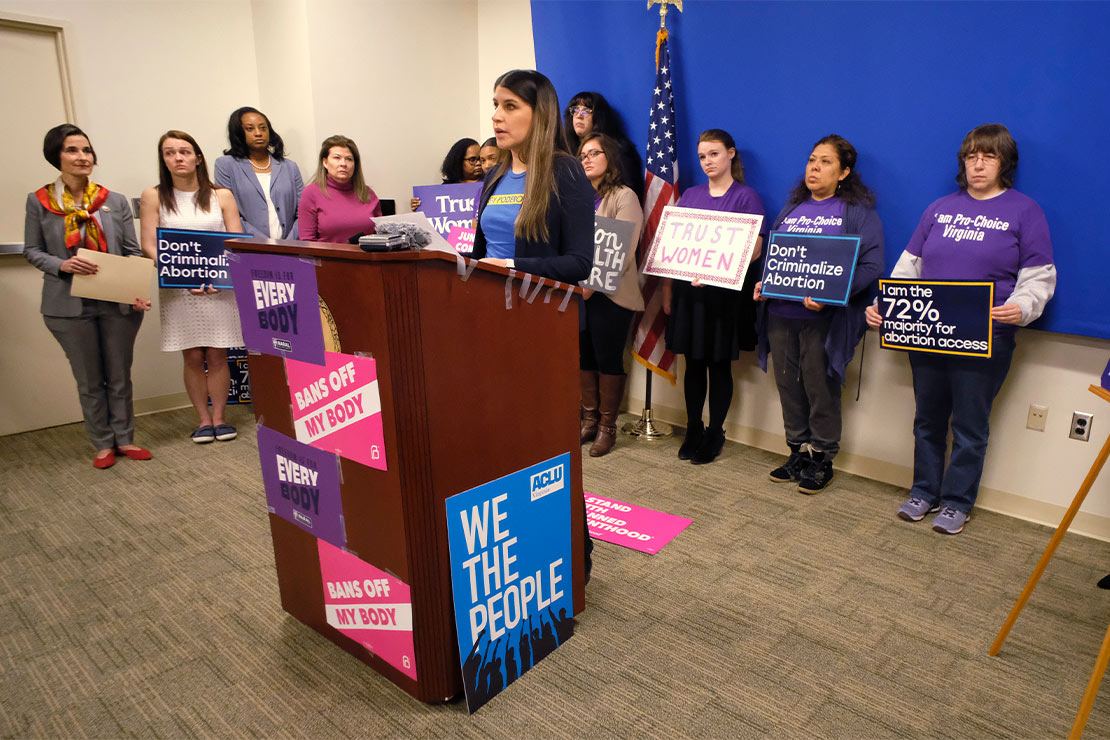
ASSOCIATED PRESS
In Virginia, a special election for a state senate seat drew national attention earlier this year because of its potential to impact abortion access in the state. ACLU National sprung to action with strategic consultation and on-the-ground support from the ACLU of Virginia by launching a voter education campaign to ensure that every constituent knew the candidates’ stances on abortion rights. With a clear understanding of the stakes of the election, voters rejected a candidate that advocated for limiting abortion access, and elected a candidate who increased the pro-reproductive freedom majority in the state senate — which ultimately halted Governor Youngkin’s priority 15-week abortion ban in its tracks.
Nebraska
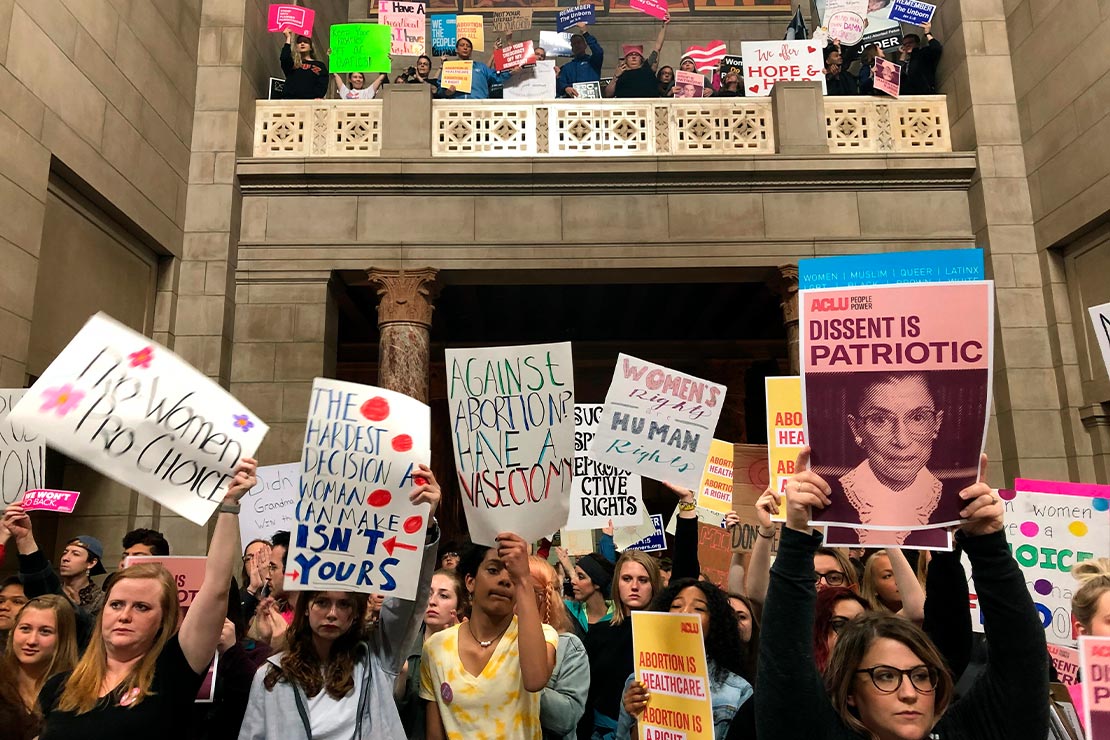
ASSOCIATED PRESS
In Nebraska, we’ve been working tirelessly to mobilize supporters against a ban on abortion around six weeks of pregnancy, before many know they are pregnant, by mobilizing Nebraskans to take actions digitally and in person at the capitol, ensuring their voices are heard and abortion access isn’t taken away without a fight.
North Carolina
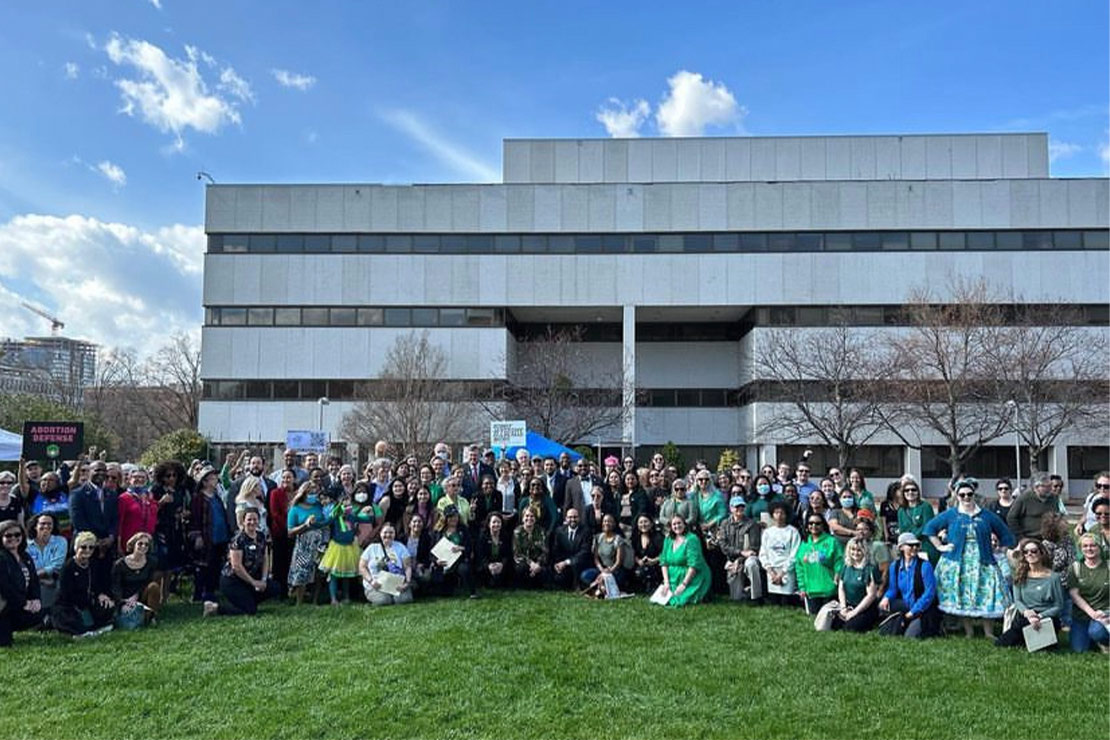
Photo courtesy of Planned Parenthood South Atlantic.
In North Carolina, we’ve kept up the pressure on the state legislature as rumors swirled about an extreme abortion ban that politicians are considering behind closed doors, which has been delayed because of deep divisions among forced-pregnancy legislators. We won’t just wait quietly for legislators to strip our rights away — we’re forcing a public debate by engaging businesses of all sizes and doctors across the state to spread the word about the severe harms that banning abortion will inflict on North Carolinians.
New York
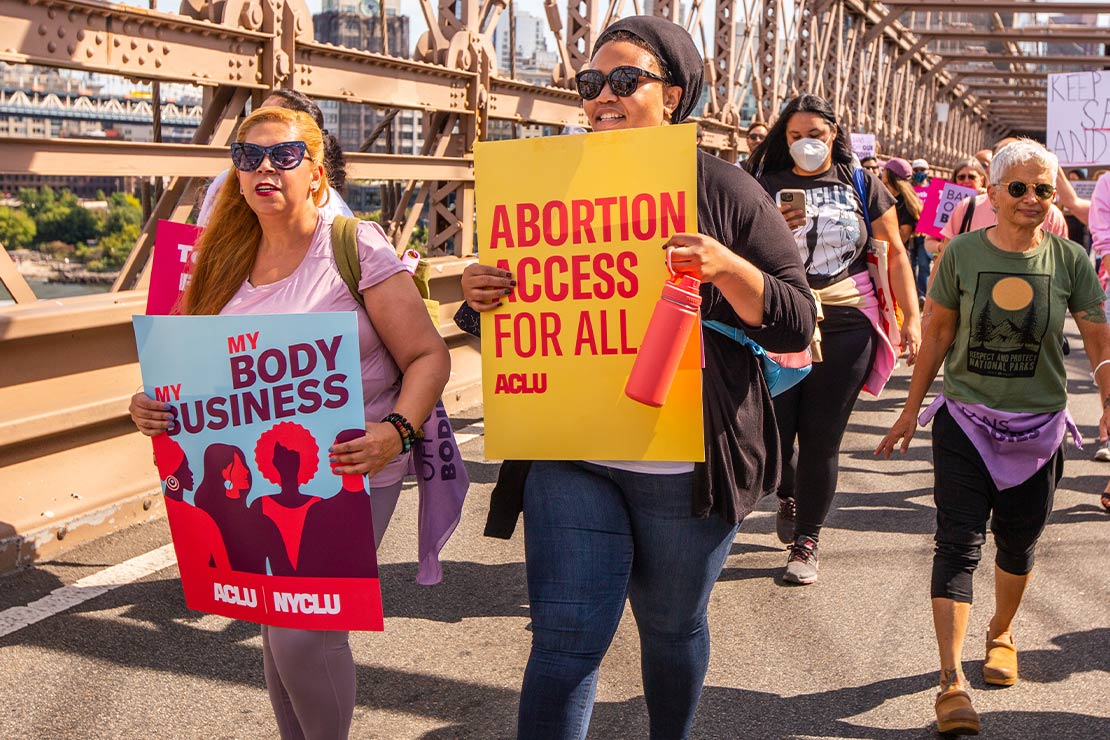
ACLU / James Matthew Daniel
In New York, a broad coalition of state advocates helped to advance the Equal Rights Amendment through a final vote in the legislature earlier this year, officially sending the measure to the November 2024 ballot for voters to consider. If passed, the amendment would prohibit discrimination by the government based on a person’s ethnicity, national origin, age, disability, or sex — including their sexual orientation, gender identity, gender expression, pregnancy, and pregnancy outcomes — protecting people’s reproductive freedom and access to abortion.
The strength of the ACLU is rooted in our deep legal and policy expertise and our presence in every state, D.C., and Puerto Rico. But we don’t, and couldn’t, do this work alone: We collaborate with state and local allies to work on emerging issues in every zip code across the country. While abortion access and our bodily autonomy continually face dogged attacks, we will respond with relentless advocacy and won’t stop fighting until every person can get the essential health care they need — no matter where they live.
Published April 1, 2023 at 02:00AM
via ACLU https://ift.tt/HUDgwxO
ACLU: How the ACLU is Showing Up For Abortion Access Nationwide
Across the country, the ACLU, allied organizations, volunteers, and organizers are mobilizing together in the ongoing battle for our reproductive freedom and bodily autonomy — regardless of which state we call home. When anti-abortion extremists attempt to enforce bans on abortion, we show up. When they prioritize abortion bans over legislation that would actually improve their constituents’ lives, we show up. When overzealous prosecutors go after health care providers and patients seeking abortion care, we show up. When it’s time to make our voices heard in the ballot box and the streets, we show up.
Here are some of the ways we’ve shown up to protect abortion access in states across the country.
Michigan

ACLU / Erin Kirkland
In Michigan, with coalition partners, the ACLU of Michigan co-led the fight to enshrine the right to reproductive freedom, including abortion, prenatal care, birth control, and all decisions regarding reproductive health, in the state constitution last November. Building on that historic win, our affiliate supported the repeal of an abortion ban from 1931 that threatened access to care after Roe v. Wade was overturned. The bill to repeal the 92-year-old law is now before Michigan Gov. Gretchen Whitmer, who is expected to sign it soon.
Virginia

ASSOCIATED PRESS
In Virginia, a special election for a state senate seat drew national attention earlier this year because of its potential to impact abortion access in the state. ACLU National sprung to action with strategic consultation and on-the-ground support from the ACLU of Virginia by launching a voter education campaign to ensure that every constituent knew the candidates’ stances on abortion rights. With a clear understanding of the stakes of the election, voters rejected a candidate that advocated for limiting abortion access, and elected a candidate who increased the pro-reproductive freedom majority in the state senate — which ultimately halted Governor Youngkin’s priority 15-week abortion ban in its tracks.
Nebraska

ASSOCIATED PRESS
In Nebraska, we’ve been working tirelessly to mobilize supporters against a ban on abortion around six weeks of pregnancy, before many know they are pregnant, by mobilizing Nebraskans to take actions digitally and in person at the capitol, ensuring their voices are heard and abortion access isn’t taken away without a fight.
North Carolina

Photo courtesy of Planned Parenthood South Atlantic.
In North Carolina, we’ve kept up the pressure on the state legislature as rumors swirled about an extreme abortion ban that politicians are considering behind closed doors, which has been delayed because of deep divisions among forced-pregnancy legislators. We won’t just wait quietly for legislators to strip our rights away — we’re forcing a public debate by engaging businesses of all sizes and doctors across the state to spread the word about the severe harms that banning abortion will inflict on North Carolinians.
New York

ACLU / James Matthew Daniel
In New York, a broad coalition of state advocates helped to advance the Equal Rights Amendment through a final vote in the legislature earlier this year, officially sending the measure to the November 2024 ballot for voters to consider. If passed, the amendment would prohibit discrimination by the government based on a person’s ethnicity, national origin, age, disability, or sex — including their sexual orientation, gender identity, gender expression, pregnancy, and pregnancy outcomes — protecting people’s reproductive freedom and access to abortion.
The strength of the ACLU is rooted in our deep legal and policy expertise and our presence in every state, D.C., and Puerto Rico. But we don’t, and couldn’t, do this work alone: We collaborate with state and local allies to work on emerging issues in every zip code across the country. While abortion access and our bodily autonomy continually face dogged attacks, we will respond with relentless advocacy and won’t stop fighting until every person can get the essential health care they need — no matter where they live.
Published March 31, 2023 at 09:30PM
via ACLU https://ift.tt/ubX70AZ
St. Kitts and Nevis: 2023 Article IV Consultation-Press Release; Staff Report; and Statement by the Executive Director for St. Kitts and Nevis
Published March 31, 2023 at 07:00AM
Read more at imf.org
Thursday 30 March 2023
Japan: 2023 Article IV consultation-Press Release; Staff Report; and Statement by the Executive Director for Japan
Published March 31, 2023 at 04:00AM
Read more at imf.org
ACLU: Here's How New Mexico is Leading the Way for Voting Rights
Voting is the cornerstone of our democracy, and protecting that right is one of the central obligations of our government. Due to partisan gridlock in Congress, the federal government has not acted to restore some of the original protections of the Voting Rights Act of 1965 (VRA). Following the Supreme Court decisions in Shelby v. Holder and Brnovich v. DNC that weakened the vital voting rights law, the federal government has yet to pass federal legislation to protect the right to vote.
New Mexico Gov. Michelle Lujan Grisham just signed the state’s Voting Rights Act, sweeping legislation that will greatly expand voting access to thousands of people across the state. While national action is desperately needed from Congress and President Biden to restore the original voter protections in the VRA, New Mexico’s Voting Rights Act is a significant step toward ensuring all eligible voters’ voices are heard.
The New Mexico Voting Rights Act was crafted with the collaboration and input of tribal governments, and Native leaders specifically, to improve collaboration between the state and its sovereign nations. It will also standardize early voting on tribal lands and secure ballot drop boxes. This new law will now erase double standards which required tribes to request their polling locations years ahead of the rest of the state and creates additional solutions to the voting access issues facing rural, unaddressed communities, by allowing tribes to designate additional registration sites, where tribal voters can reliably receive mail, and register accurately in their community. Native people should not have a higher barrier to requesting election resources, and the New Mexico Voting Rights Act eliminates that unreasonable disparity.
The Voting Rights Act also amends existing law to eliminate dysfunction in the restoration of voting rights to formerly incarcerated people. This legislation sends a critical message about the rehabilitative power of voting and being a valued member of your community by automatically restoring the constitutional right to vote after incarceration and will result in an opportunity to vote for 11,000 New Mexicans by the next federal election.
This new law will also strengthen voting by mail. In 2020, 65 million Americans decided to vote by mail because it’s safe, secure and accessible, just like a fair and free democracy should be. Allowing eligible voters to mark their preference for a mail-in ballot is a tried-and-true way to ensure all eligible New Mexicans can participate in our state’s elections, particularly for elderly and home-bound voters and those with limited transportation options.
By signing this bill into law, New Mexico is showing the rest of the U.S. how to strengthen our democracy and expand voting access at a time when countless states nationwide are trying to undermine our fundamental right to vote. By leading with fundamental values of equality under the law and free and fair elections, New Mexico is stepping up to be a nationwide leader in voter rights.
Published March 31, 2023 at 12:35AM
via ACLU https://ift.tt/YSm6jn1
ACLU: Here's How New Mexico is Leading the Way for Voting Rights
Voting is the cornerstone of our democracy, and protecting that right is one of the central obligations of our government. Due to partisan gridlock in Congress, the federal government has not acted to restore some of the original protections of the Voting Rights Act of 1965 (VRA). Following the Supreme Court decisions in Shelby v. Holder and Brnovich v. DNC that weakened the vital voting rights law, the federal government has yet to pass federal legislation to protect the right to vote.
New Mexico Gov. Michelle Lujan Grisham just signed the state’s Voting Rights Act, sweeping legislation that will greatly expand voting access to thousands of people across the state. While national action is desperately needed from Congress and President Biden to restore the original voter protections in the VRA, New Mexico’s Voting Rights Act is a significant step toward ensuring all eligible voters’ voices are heard.
The New Mexico Voting Rights Act was crafted with the collaboration and input of tribal governments, and Native leaders specifically, to improve collaboration between the state and its sovereign nations. It will also standardize early voting on tribal lands and secure ballot drop boxes. This new law will now erase double standards which required tribes to request their polling locations years ahead of the rest of the state and creates additional solutions to the voting access issues facing rural, unaddressed communities, by allowing tribes to designate additional registration sites, where tribal voters can reliably receive mail, and register accurately in their community. Native people should not have a higher barrier to requesting election resources, and the New Mexico Voting Rights Act eliminates that unreasonable disparity.
The Voting Rights Act also amends existing law to eliminate dysfunction in the restoration of voting rights to formerly incarcerated people. This legislation sends a critical message about the rehabilitative power of voting and being a valued member of your community by automatically restoring the constitutional right to vote after incarceration and will result in an opportunity to vote for 11,000 New Mexicans by the next federal election.
This new law will also strengthen voting by mail. In 2020, 65 million Americans decided to vote by mail because it’s safe, secure and accessible, just like a fair and free democracy should be. Allowing eligible voters to mark their preference for a mail-in ballot is a tried-and-true way to ensure all eligible New Mexicans can participate in our state’s elections, particularly for elderly and home-bound voters and those with limited transportation options.
By signing this bill into law, New Mexico is showing the rest of the U.S. how to strengthen our democracy and expand voting access at a time when countless states nationwide are trying to undermine our fundamental right to vote. By leading with fundamental values of equality under the law and free and fair elections, New Mexico is stepping up to be a nationwide leader in voter rights.
Published March 30, 2023 at 08:05PM
via ACLU https://ift.tt/1UObKG0
Wednesday 29 March 2023
Papua New Guinea: Requests for an Arrangement under the Extended Credit Facility and an Extended Arrangement under the Extended Fund Facility-Press Release; Staff Report; and Statement by the Executive Director for the Papua New Guinea
Published March 29, 2023 at 07:00AM
Read more at imf.org
Tuesday 28 March 2023
Republic of Tajikistan: 2022 Article IV Consultation-Press Release; Staff Report; and Statement by the Executive Director for the Republic of Tajikistan
Published March 28, 2023 at 07:00AM
Read more at imf.org
Monday 27 March 2023
ACLU: This Law Could Criminalize Everyday Conversations About Immigration
At rallies across the country, community members have been chanting “Sí, se puede!” to demand that the U.S. fulfill its moral obligation to undocumented immigrants by expanding their access to life-saving medical care, job-loss benefits, driver’s licenses, and much more. However, this political advocacy — critical to our democracy’s debate about our immigration policies — could constitute a crime under federal law.
A section of the federal Immigration and Nationality Act (INA) known as the “encouragement provision” makes it a crime to “encourage” or “induce” a noncitizen “to come to, enter, or reside in the United States” unlawfully. But doesn’t the First Amendment give us the right to express our views on immigration, including by advocating for the rights of undocumented immigrants? Yes, it does, and that’s why we’re arguing before the Supreme Court to strike down this law.
Across the country, noncitizens, their families, lawyers, immigration rights advocates, and others risk violating the encouragement provision every time they debate U.S. immigration policies or even have a conversation about what resources or next steps may be available for people who are undocumented or no longer have a lawful basis for being in the U.S.
Free speech that might result in a person’s criminal prosecution under the provision include:
- A grandmother who tells her undocumented grandchild that she doesn’t want them to leave her.
- A doctor advising a patient with an expiring student visa that the patient needs medical treatment that is only offered in the United States.
- A priest informing a noncitizen parishioner whose employment authorization is ending about child-care and pantry resources that would support her remaining.
- A lawyer counseling an out-of-status noncitizen that she has the ability to become a lawful permanent resident if she does not leave the country.
- A professor advocating for DACA recipients to remain in the country no matter what so that Congress will be pressured to grant a path towards citizenship, while pointing out how her university’s policy of accepting DREAMers has enriched her teaching experience.
All that a prosecutor must prove for a conviction is that a person knew or recklessly disregarded the fact that the noncitizen’s entry or residence would be unlawful. While advocates for the provision say it will reduce unlawful entries, the government cannot enforce its immigration laws and policies by restricting constitutionally protected speech.
That’s the argument the ACLU is making this month in U.S. v. Hansen, a case that will decide whether the encouragement provision violates the First Amendment. In this case, a California man, Helaman Hansen, was convicted of violating the provision by encouraging two noncitizens to remain in the U.S. after their visas expired. Mr. Hansen’s words did not encourage a crime; residing in the country after one’s visa expires is merely a violation of civil immigration laws.
The encouragement provision did not originate in law that infringed on the First Amendment, but it has been expanded over the years to criminalize speech merely advocating for actions that violate civil immigration laws, and are not crimes in themselves. The provision, which was introduced in its current form in 1986, was predated by historical efforts to limit foreign contract labor going back as far as the 1885 Foran Act. These earlier laws focused on prohibiting advertisements of U.S. job opportunities to noncitizens abroad. In 1952, the focus shifted to prohibiting encouraging or inducing noncitizens living outside the U.S. to unlawfully enter the U.S. It wasn’t until 1986 that Congress expanded the encouragement provision to also cover encouraging or inducing a noncitizen already present in the U.S. to remain in the country unlawfully.
In other subsections of this same federal statute, Congress criminalized harboring and transporting noncitizens who are in the United States unlawfully, or bringing noncitizens into the U.S. without authorization. While these actions are a legitimate target of government policy, the text of the encouragement provision and its expansion over the years now criminalizes everyday speech, including political advocacy, religious counsel, and legal support. Today, the provision has essentially no limits — it doesn’t require the speaker to intend a noncitizen to commit a crime, or that the criminalized speech be directed at a specific undocumented immigrant.
If the government is legally allowed to ban speech encouraging or inducing unlawful immigration, it would be empowered to ban or chill any speech that advocates violating any laws, including civil ones. Americans could lose the ability to advocate against any laws with which they disagree, including by proposing and organizing civil disobedience. Far from being a partisan issue, the fate of the encouragement provision is tied to the ability of people to criticize mask mandates, or to advocate for abortion rights. It is even linked to our access to quality journalism on pressing issues. The U.S. government has already used the provision as a justification to target journalists reporting on immigration — in particular, people arriving at the U.S.-Mexico border to seek asylum in late 2018 and early 2019 — leading to fear among journalists that they would be prosecuted for simply reporting the news.
Rather than resolve the many issues with our immigration system, the encouragement provision targets neighbors, advocates, journalists, immigration lawyers, and doctors for prosecution.
For years, the Supreme Court has recognized that the First Amendment protects us from criminal punishment for simply encouraging an unlawful act as long as we aren’t imminently inciting crime. The encouragement provision is unnecessary to serve any legitimate government interest in restricting immigration. It serves only to threaten the foundational free speech values that allow our democracy to permit dissent through vibrant and robust debate about the justness of the laws that govern us.
Published March 27, 2023 at 09:48PM
via ACLU https://ift.tt/qAgHEGW
ACLU: This Law Could Criminalize Everyday Conversations About Immigration
At rallies across the country, community members have been chanting “Sí, se puede!” to demand that the U.S. fulfill its moral obligation to undocumented immigrants by expanding their access to life-saving medical care, job-loss benefits, driver’s licenses, and much more. However, this political advocacy — critical to our democracy’s debate about our immigration policies — could constitute a crime under federal law.
A section of the federal Immigration and Nationality Act (INA) known as the “encouragement provision” makes it a crime to “encourage” or “induce” a noncitizen “to come to, enter, or reside in the United States” unlawfully. But doesn’t the First Amendment give us the right to express our views on immigration, including by advocating for the rights of undocumented immigrants? Yes, it does, and that’s why we’re arguing before the Supreme Court to strike down this law.
Across the country, noncitizens, their families, lawyers, immigration rights advocates, and others risk violating the encouragement provision every time they debate U.S. immigration policies or even have a conversation about what resources or next steps may be available for people who are undocumented or no longer have a lawful basis for being in the U.S.
Free speech that might result in a person’s criminal prosecution under the provision include:
- A grandmother who tells her undocumented grandchild that she doesn’t want them to leave her.
- A doctor advising a patient with an expiring student visa that the patient needs medical treatment that is only offered in the United States.
- A priest informing a noncitizen parishioner whose employment authorization is ending about child-care and pantry resources that would support her remaining.
- A lawyer counseling an out-of-status noncitizen that she has the ability to become a lawful permanent resident if she does not leave the country.
- A professor advocating for DACA recipients to remain in the country no matter what so that Congress will be pressured to grant a path towards citizenship, while pointing out how her university’s policy of accepting DREAMers has enriched her teaching experience.
All that a prosecutor must prove for a conviction is that a person knew or recklessly disregarded the fact that the noncitizen’s entry or residence would be unlawful. While advocates for the provision say it will reduce unlawful entries, the government cannot enforce its immigration laws and policies by restricting constitutionally protected speech.
That’s the argument the ACLU is making this month in U.S. v. Hansen, a case that will decide whether the encouragement provision violates the First Amendment. In this case, a California man, Helaman Hansen, was convicted of violating the provision by encouraging two noncitizens to remain in the U.S. after their visas expired. Mr. Hansen’s words did not encourage a crime; residing in the country after one’s visa expires is merely a violation of civil immigration laws.
The encouragement provision did not originate in law that infringed on the First Amendment, but it has been expanded over the years to criminalize speech merely advocating for actions that violate civil immigration laws, and are not crimes in themselves. The provision, which was introduced in its current form in 1986, was predated by historical efforts to limit foreign contract labor going back as far as the 1885 Foran Act. These earlier laws focused on prohibiting advertisements of U.S. job opportunities to noncitizens abroad. In 1952, the focus shifted to prohibiting encouraging or inducing noncitizens living outside the U.S. to unlawfully enter the U.S. It wasn’t until 1986 that Congress expanded the encouragement provision to also cover encouraging or inducing a noncitizen already present in the U.S. to remain in the country unlawfully.
In other subsections of this same federal statute, Congress criminalized harboring and transporting noncitizens who are in the United States unlawfully, or bringing noncitizens into the U.S. without authorization. While these actions are a legitimate target of government policy, the text of the encouragement provision and its expansion over the years now criminalizes everyday speech, including political advocacy, religious counsel, and legal support. Today, the provision has essentially no limits — it doesn’t require the speaker to intend a noncitizen to commit a crime, or that the criminalized speech be directed at a specific undocumented immigrant.
If the government is legally allowed to ban speech encouraging or inducing unlawful immigration, it would be empowered to ban or chill any speech that advocates violating any laws, including civil ones. Americans could lose the ability to advocate against any laws with which they disagree, including by proposing and organizing civil disobedience. Far from being a partisan issue, the fate of the encouragement provision is tied to the ability of people to criticize mask mandates, or to advocate for abortion rights. It is even linked to our access to quality journalism on pressing issues. The U.S. government has already used the provision as a justification to target journalists reporting on immigration — in particular, people arriving at the U.S.-Mexico border to seek asylum in late 2018 and early 2019 — leading to fear among journalists that they would be prosecuted for simply reporting the news.
Rather than resolve the many issues with our immigration system, the encouragement provision targets neighbors, advocates, journalists, immigration lawyers, and doctors for prosecution.
For years, the Supreme Court has recognized that the First Amendment protects us from criminal punishment for simply encouraging an unlawful act as long as we aren’t imminently inciting crime. The encouragement provision is unnecessary to serve any legitimate government interest in restricting immigration. It serves only to threaten the foundational free speech values that allow our democracy to permit dissent through vibrant and robust debate about the justness of the laws that govern us.
Published March 27, 2023 at 05:18PM
via ACLU https://ift.tt/A014bhf
Peru: 2023 Article IV Consultation-Press Release; Staff Report; and Statement by the Executive Director for Peru
Published March 27, 2023 at 07:00AM
Read more at imf.org
Friday 24 March 2023
Panama: 2022 Article IV Consultation-Press Release; Staff Report; and Statement by the Executive Director for Panama
Published March 24, 2023 at 07:00AM
Read more at imf.org
ACLU: How Officials in Georgia are Suppressing Political Protest as ‘Domestic Terrorism’
Over the past few months, 42 activists have been charged with “domestic terrorism” under Georgia state law. Their acts of “terrorism”? Alleged property damage and trespassing while protesting. These prosecutions exemplify a highly problematic trend of the government — both state and federal — using domestic terrorism powers to punish dissent.
In Georgia, the arrested activists are part of a movement seeking to stop the construction of a $90 million police training facility located in a forest in Southeast Atlanta. Since late 2021, protesters under the banners of “Stop Cop City” and “Protect the Weelaunee Forest” have raised concerns over climate justice, displacement of Black communities, and increasing militarization of police forces. Protesters have camped out in the forest, staged marches, and hosted community events. At times, a small minority of protesters have damaged property.
Georgia police have responded with overwhelming and disproportionate force. Police killed one protester in January. They have arrested dozens more, including a legal observer associated with the Southern Poverty Law Center and the National Lawyers Guild. And prosecutors have levied severe charges under Georgia’s rarely-used domestic terrorism statute.
Until 2017, Georgia’s domestic terrorism statute criminalized acts intended to or reasonably likely to kill or injure at least 10 people. In the wake of the massacre of nine Black parishioners by a white supremacist gunman in Charleston, South Carolina, the Georgia legislature amended the statute by vastly expanding its reach. The new law broadened the state’s definition of “domestic terrorism” to include certain property crimes committed with the intent to “alter, change, or coerce the policy of the government” by “intimidation or coercion.”
The amendment added a stigmatizing label and a harsher punishment — up to 35 years in prison — to property crimes that were already illegal, simply because of accompanying political expression critical of government policy. At the time of the amendment’s passing, the ACLU of Georgia and other civil rights groups objected that the statute could be weaponized to suppress protected First Amendment activity. These concerns are now a reality for “Cop City” activists.
The recent arrests demonstrate how overbroad laws like Georgia’s can be wielded to disproportionately punish people who express political beliefs. The “Stop Cop City” defendants are not accused of injuring, or even attempting to injure, anyone at all. At most, they are accused of damaging property, and some defendants appear to be accused of no more than misdemeanor trespass. But the state has chosen to press extreme charges of “domestic terrorism” because the defendants were also engaged in a political protest that challenges the increasing militarization of the police.
Prosecutors’ rush to slap “domestic terrorism” charges on protesters also threatens to chill the legitimate exercise of First Amendment rights by the protestors’ allies and others. Sometimes, during an otherwise peaceful political protest, a small group of individuals might throw objects or engage in vandalism. Law-abiding protesters in the vicinity risk being mistakenly (or carelessly) accused of participating in those actions — and being charged not just with a minor property crime, but with terrorism and a potential 35-year prison sentence. The danger of facing such severe charges can force protesters to make a difficult choice: surrender their cause or risk being labeled and locked up as a “terrorist.”
The events in Atlanta reflect a disturbing nationwide trend to respond to the very real problem of rising white nationalist violence with broad “counter-terrorism” measures that can stifle dissent. On the heels of the January 6 riots at the Capitol, President Biden announced an unprecedented nationwide strategy to combat domestic terrorism. The strategy left open the possibility of a new federal domestic terrorism statute, despite the dozens of existing laws that already criminalize hate-motivated and other violent acts. It did nothing to rein in national security policies that target Black and Brown communities and people engaged in dissent for unjustified surveillance, investigation, and prosecution.
As states have increasingly passed “domestic terrorism” laws, the result is that a range of at times wholly innocent or constitutionally protected activity is penalized and stigmatized with a politically-charged label. Domestic terrorism laws — whether at the state or federal level — are not only unnecessary but dangerous. Prosecutors in Georgia should drop the domestic terrorism charges against the “Cop City” activists and stop using the statute to punish and chill legitimate political protest.
Published March 24, 2023 at 02:38PM
via ACLU https://ift.tt/wun7v4m
ACLU: How Officials in Georgia are Suppressing Political Protest as ‘Domestic Terrorism’
Over the past few months, 42 activists have been charged with “domestic terrorism” under Georgia state law. Their acts of “terrorism”? Alleged property damage and trespassing while protesting. These prosecutions exemplify a highly problematic trend of the government — both state and federal — using domestic terrorism powers to punish dissent.
In Georgia, the arrested activists are part of a movement seeking to stop the construction of a $90 million police training facility located in a forest in Southeast Atlanta. Since late 2021, protesters under the banners of “Stop Cop City” and “Protect the Weelaunee Forest” have raised concerns over climate justice, displacement of Black communities, and increasing militarization of police forces. Protesters have camped out in the forest, staged marches, and hosted community events. At times, a small minority of protesters have damaged property.
Georgia police have responded with overwhelming and disproportionate force. Police killed one protester in January. They have arrested dozens more, including a legal observer associated with the Southern Poverty Law Center and the National Lawyers Guild. And prosecutors have levied severe charges under Georgia’s rarely-used domestic terrorism statute.
Until 2017, Georgia’s domestic terrorism statute criminalized acts intended to or reasonably likely to kill or injure at least 10 people. In the wake of the massacre of nine Black parishioners by a white supremacist gunman in Charleston, South Carolina, the Georgia legislature amended the statute by vastly expanding its reach. The new law broadened the state’s definition of “domestic terrorism” to include certain property crimes committed with the intent to “alter, change, or coerce the policy of the government” by “intimidation or coercion.”
The amendment added a stigmatizing label and a harsher punishment — up to 35 years in prison — to property crimes that were already illegal, simply because of accompanying political expression critical of government policy. At the time of the amendment’s passing, the ACLU of Georgia and other civil rights groups objected that the statute could be weaponized to suppress protected First Amendment activity. These concerns are now a reality for “Cop City” activists.
The recent arrests demonstrate how overbroad laws like Georgia’s can be wielded to disproportionately punish people who express political beliefs. The “Stop Cop City” defendants are not accused of injuring, or even attempting to injure, anyone at all. At most, they are accused of damaging property, and some defendants appear to be accused of no more than misdemeanor trespass. But the state has chosen to press extreme charges of “domestic terrorism” because the defendants were also engaged in a political protest that challenges the increasing militarization of the police.
Prosecutors’ rush to slap “domestic terrorism” charges on protesters also threatens to chill the legitimate exercise of First Amendment rights by the protestors’ allies and others. Sometimes, during an otherwise peaceful political protest, a small group of individuals might throw objects or engage in vandalism. Law-abiding protesters in the vicinity risk being mistakenly (or carelessly) accused of participating in those actions — and being charged not just with a minor property crime, but with terrorism and a potential 35-year prison sentence. The danger of facing such severe charges can force protesters to make a difficult choice: surrender their cause or risk being labeled and locked up as a “terrorist.”
The events in Atlanta reflect a disturbing nationwide trend to respond to the very real problem of rising white nationalist violence with broad “counter-terrorism” measures that can stifle dissent. On the heels of the January 6 riots at the Capitol, President Biden announced an unprecedented nationwide strategy to combat domestic terrorism. The strategy left open the possibility of a new federal domestic terrorism statute, despite the dozens of existing laws that already criminalize hate-motivated and other violent acts. It did nothing to rein in national security policies that target Black and Brown communities and people engaged in dissent for unjustified surveillance, investigation, and prosecution.
As states have increasingly passed “domestic terrorism” laws, the result is that a range of at times wholly innocent or constitutionally protected activity is penalized and stigmatized with a politically-charged label. Domestic terrorism laws — whether at the state or federal level — are not only unnecessary but dangerous. Prosecutors in Georgia should drop the domestic terrorism charges against the “Cop City” activists and stop using the statute to punish and chill legitimate political protest.
Published March 24, 2023 at 08:08PM
via ACLU https://ift.tt/pq0VEu9
Thursday 23 March 2023
Wednesday 22 March 2023
Georgia: Technical Assistance Report-Operationalizing the New Bank Recovery and Resolution Framework
Published March 22, 2023 at 07:00AM
Read more at imf.org
ACLU: My Son's Hair is Part of a Thousand-Year-Old Tribal Culture. His School Called it a 'Fad.'
My Native American first-grader Logan loves his long braid. It connects my son to our cultural and spiritual traditions as members of the Waccamaw Siouan Tribe of North Carolina. For thousands of years, male members of our tribe have worn their hair long. It is our spiritual belief that a person’s hair is a part of the spirit of the person. With his hair arranged in a long braid running down his back, Logan is confident and proud.
Logan goes to school at Classical Charter Schools of Leland in North Carolina (formerly called Charter Day School). I chose that school because the teachers are really focused on educating the kids. The school requires boys to keep their hair off the collar and not below the top of the ears, so Logan has worn his long hair in a bun. This compromised his beliefs, but it appeared necessary to meet the school’s standards. For all of kindergarten and most of first grade, Logan has attended school with his long hair in a bun without incident.
A few weeks ago, my husband and I were told that Logan’s hair was deemed “faddish” by school officials and in violation of the school’s “grooming standards” for boys. My son overheard his teacher say that he would have to cut his hair, which made him feel very sad. When I asked a school administrator why boys had to have short hair to come to school, I was told, “We want them all to look the same.”
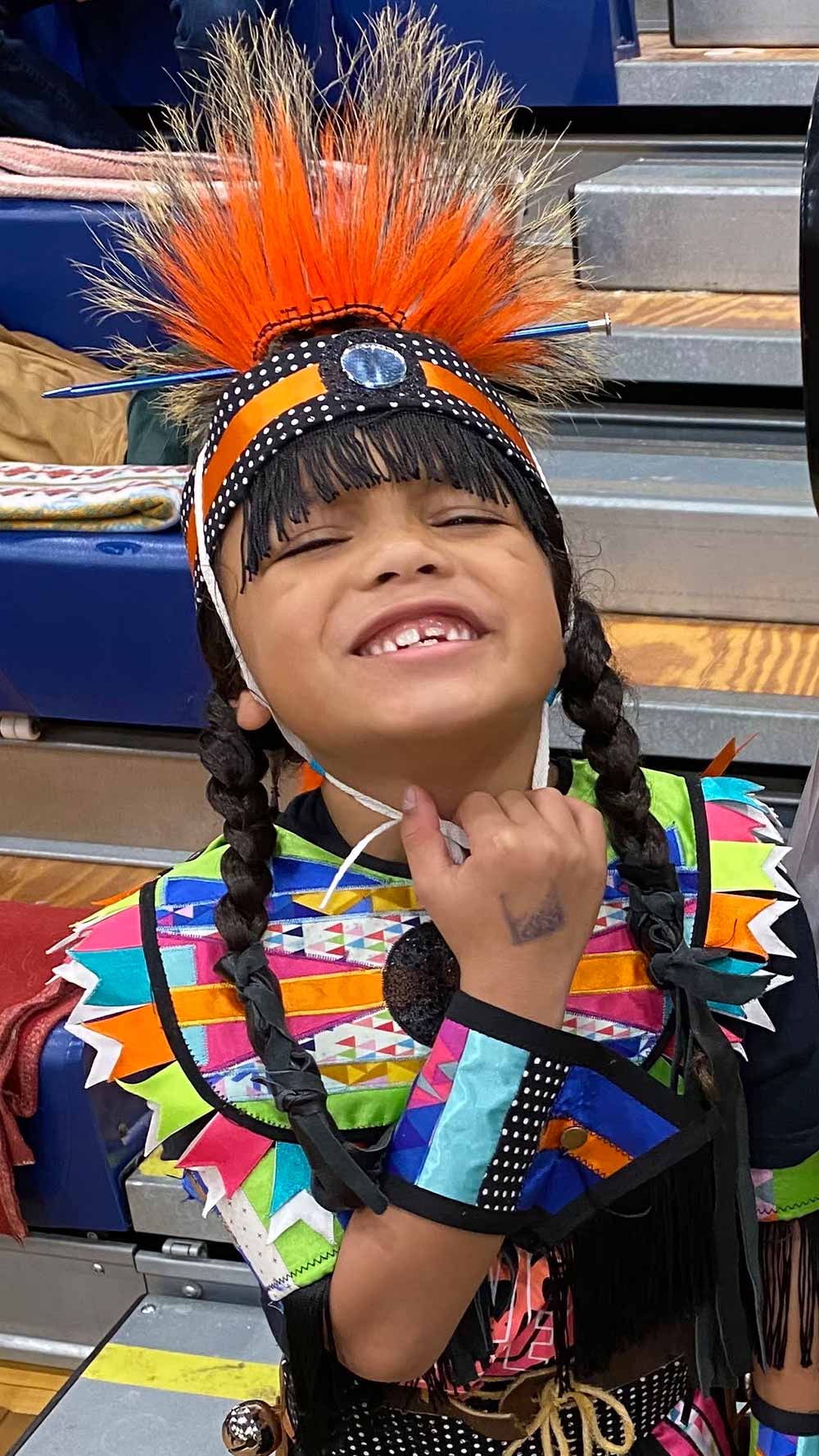
Logan Lomboy, with his hair in braids, dressed in the traditional clothing of the Waccamaw Siouan Tribe.
Credit: Ashley Lomboy
The definition of faddish according to Webster’s dictionary is “intensely fashionable for a short time.” Native Americans have been wearing their hair long — whether it is for ceremony, in preparation for protecting our tribe, or as part of our tradition — since time immemorial. For more than 1,000 years, the Waccamaw Siouan tribe has and continues to steward the land that the school currently occupies, as well as all the surrounding land of the Cape Fear Region. This is the very definition of long-term and the opposite of a “fad.” For Native American boys and men, wearing their hair long is traditional.
I explained the importance of my son’s hair to his religion and culture to school administrators, and I questioned how they could justify applying their short hair rule and no buns policy to boys only. But the administration denied my request for an exception for Logan from their policies. I begged the school to allow Logan to complete the last few months of first grade with his hair in a bun or braid. Again, they said no. As a parent, I am in the untenable position of having to disrupt the education of my first grader by changing his school abruptly during the school year — or I have to cause Logan significant spiritual, religious, and cultural harm by cutting his hair.
Cutting Logan’s hair is not an option. Logan’s hair is a part of him and our religious practice. His long hair carries his spirit; hair cutting cycles are part of our tribal ceremonies. Logan is a grass dancer and has danced in Native American powwows all over the United States. His hair is a part of his regalia and serves as a key element to the type of dancer he is. Without his hair, he will lose his spirit and connection to his dance.
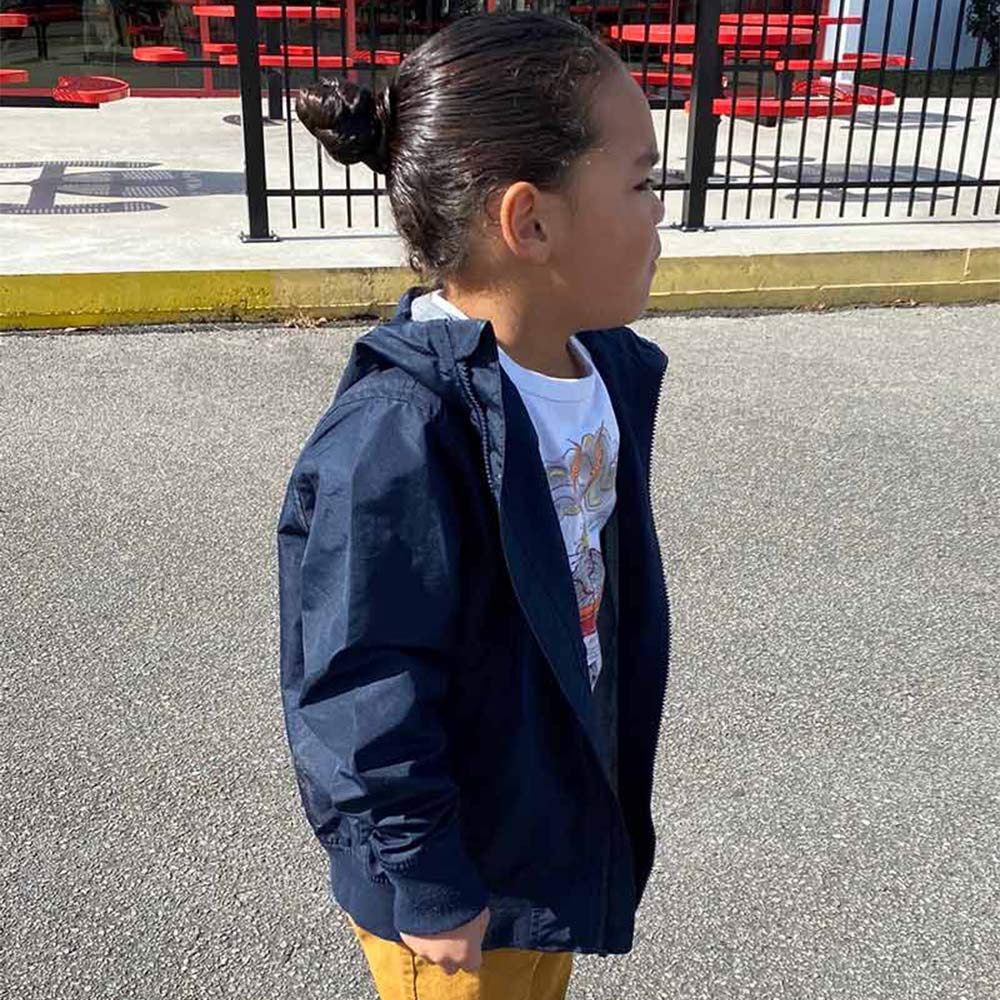
Logan Lomboy with his hair in a bun.
Ashley Lomboy
No student at a public charter school like Classical Charter Schools of Leland should be forced to cut their hair. For Logan, it’s a rejection of who he is and a demand that he sacrifice his culture and heritage to conform to baseless and unfair rules. This is an old tactic of exclusion and assimilation. At the Indian Boarding Schools, for many Native American students, one of the most immediate and devastating experiences of forced assimilation was having their long hair cut immediately following their arrival. In the present day, schools across the country have refused to allow Native American students to wear tribal regalia at school or even at their graduation, forcing them to hide a critical part of their identity.
As Native Americans, it is our job — every single day — to educate ourselves, the greater community, educational institutions, and every facet of society about why it is important to honor, acknowledge, and recognize who we are. This job is not something we are paid for, it’s not something we get a choice in, it is a fact of our everyday life. It is vital that my son’s school understands the importance of his hair and all it signifies. This learning cannot just be at a surface level, but at every level of administration, so my son does not feel shamed for his culture and religion at school or anywhere else.
This issue is not something my family, my local or extended tribal community across the country, my BIPOC community, or my trusted allies and partners take lightly. That’s why I submitted a letter to the school’s board of trustees to again explain the importance of Logan’s hair to our religion and culture, and to ask that he be allowed to continue his schooling as the proud Waccamaw Siouan boy that he is, braid and all.
Published March 22, 2023 at 11:53PM
via ACLU https://ift.tt/DtLn8v6
ACLU: My Son's Hair is Part of a Thousand-Year-Old Tribal Culture. His School Called it a 'Fad.'
My Native American first-grader Logan loves his long braid. It connects my son to our cultural and spiritual traditions as members of the Waccamaw Siouan Tribe of North Carolina. For thousands of years, male members of our tribe have worn their hair long. It is our spiritual belief that a person’s hair is a part of the spirit of the person. With his hair arranged in a long braid running down his back, Logan is confident and proud.
Logan goes to school at Classical Charter Schools of Leland in North Carolina (formerly called Charter Day School). I chose that school because the teachers are really focused on educating the kids. The school requires boys to keep their hair off the collar and not below the top of the ears, so Logan has worn his long hair in a bun. This compromised his beliefs, but it appeared necessary to meet the school’s standards. For all of kindergarten and most of first grade, Logan has attended school with his long hair in a bun without incident.
A few weeks ago, my husband and I were told that Logan’s hair was deemed “faddish” by school officials and in violation of the school’s “grooming standards” for boys. My son overheard his teacher say that he would have to cut his hair, which made him feel very sad. When I asked a school administrator why boys had to have short hair to come to school, I was told, “We want them all to look the same.”

Logan Lomboy, with his hair in braids, dressed in the traditional clothing of the Waccamaw Siouan Tribe.
Credit: Ashley Lomboy
The definition of faddish according to Webster’s dictionary is “intensely fashionable for a short time.” Native Americans have been wearing their hair long — whether it is for ceremony, in preparation for protecting our tribe, or as part of our tradition — since time immemorial. For more than 1,000 years, the Waccamaw Siouan tribe has and continues to steward the land that the school currently occupies, as well as all the surrounding land of the Cape Fear Region. This is the very definition of long-term and the opposite of a “fad.” For Native American boys and men, wearing their hair long is traditional.
I explained the importance of my son’s hair to his religion and culture to school administrators, and I questioned how they could justify applying their short hair rule and no buns policy to boys only. But the administration denied my request for an exception for Logan from their policies. I begged the school to allow Logan to complete the last few months of first grade with his hair in a bun or braid. Again, they said no. As a parent, I am in the untenable position of having to disrupt the education of my first grader by changing his school abruptly during the school year — or I have to cause Logan significant spiritual, religious, and cultural harm by cutting his hair.
Cutting Logan’s hair is not an option. Logan’s hair is a part of him and our religious practice. His long hair carries his spirit; hair cutting cycles are part of our tribal ceremonies. Logan is a grass dancer and has danced in Native American powwows all over the United States. His hair is a part of his regalia and serves as a key element to the type of dancer he is. Without his hair, he will lose his spirit and connection to his dance.

Logan Lomboy with his hair in a bun.
Ashley Lomboy
No student at a public charter school like Classical Charter Schools of Leland should be forced to cut their hair. For Logan, it’s a rejection of who he is and a demand that he sacrifice his culture and heritage to conform to baseless and unfair rules. This is an old tactic of exclusion and assimilation. At the Indian Boarding Schools, for many Native American students, one of the most immediate and devastating experiences of forced assimilation was having their long hair cut immediately following their arrival. In the present day, schools across the country have refused to allow Native American students to wear tribal regalia at school or even at their graduation, forcing them to hide a critical part of their identity.
As Native Americans, it is our job — every single day — to educate ourselves, the greater community, educational institutions, and every facet of society about why it is important to honor, acknowledge, and recognize who we are. This job is not something we are paid for, it’s not something we get a choice in, it is a fact of our everyday life. It is vital that my son’s school understands the importance of his hair and all it signifies. This learning cannot just be at a surface level, but at every level of administration, so my son does not feel shamed for his culture and religion at school or anywhere else.
This issue is not something my family, my local or extended tribal community across the country, my BIPOC community, or my trusted allies and partners take lightly. That’s why I submitted a letter to the school’s board of trustees to again explain the importance of Logan’s hair to our religion and culture, and to ask that he be allowed to continue his schooling as the proud Waccamaw Siouan boy that he is, braid and all.
Published March 22, 2023 at 06:23PM
via ACLU https://ift.tt/l8WayXL
Vanuatu: 2023 Article IV Consultation-Press Release; Staff Report; and Statement by the Executive Director for Vanuatu
Published March 22, 2023 at 07:00AM
Read more at imf.org
Tuesday 21 March 2023
ACLU: An Idaho College Censored Their Reproductive Health Care Art, But These Artists Won’t be Silenced
After the Supreme Court overturned Roe v. Wade last June, anti-abortion politicians didn’t just leap at the opportunity to ban abortion — they also threatened our ability to freely share information about abortion and reproductive health care, including in artwork and other forms of creative expression.
That’s what happened in Idaho when the Lewis-Clark State College Center for Arts and History removed six pieces of art depicting abortion and reproductive health care from an exhibition titled “Unconditional Care: Listening to People’s Health Needs.” The college based its decision on the state’s No Public Funds for Abortion Act (NPFAA), which prohibits the use of public funds for abortion, including in relation to speech that would “promote abortion” or “counsel in favor of abortion.”
Show curator Katrina Majkut, who also had work displayed in the exhibit, says rumblings of concern over the six pieces of art began about a week before the exhibit was set to open, but the artists were not informed their work would be removed until days, or even hours, before the show opened.

Medical Abortion Pill by Katrina Majkut
Thread on aida cloth, 11 x 14 in., 2015
The censored works include a series of documentary videos from artist Lydia Nobles where people share their experiences with pregnancy, abortion and reproductive care; a handwritten copy of one of the 250,000 letters addressed to Planned Parenthood founder Margaret Sanger from artist Michelle Hartney; and a piece of embroidery from artist and show curator Katrina Majkut that shows two pills used in medication abortion, Mifepristone and Misoprostol.
The ACLU, the ACLU of Idaho, and the National Coalition Against Censorship condemned this act of censorship in a letter to Lewis-Clark State College President Cynthia Pemberton. The letter stated that the decision to pull works of art documenting women speaking honestly about their experiences with pregnancy and abortion is censorship, which deprives the public of a critical opportunity to engage in a broader conversation about these important topics. The letter also explained that it jeopardizes a bedrock First Amendment principle that the state refrain from interfering with expressive activity because it disagrees with a particular point of view.
Nobles, Hartney, and Majkut spoke to the ACLU about the pervasive harm that censoring any art, but especially art that examines abortion and reproductive health care, can have on entire communities. These interviews have been edited for clarity and length.
Q: What was your initial reaction when you found out your work would be removed?
MAJKUT: I was in disbelief. I figured school administrators knew better than to censor art, or to egregiously apply an anti-abortion law that is meant to stop actual abortion — something we weren’t even remotely doing — to censor art. It seems I underestimated the level of fear administrators had in facing fiscal and legal retribution from Idaho’s anti-abortion lawmakers, and I overestimated administrators’ commitment to academic freedom and education over irrelevant laws and money. It was surreal to watch it all go down and to realize that I and the other artists had been put in this unwelcomed and unfair position.
HARTNEY: I didn’t know about the [NPFAA] so I was shocked that my work was censored, especially because the project is not really about abortion, it’s about birth control. It’s already hard for a lot of people who have had abortions to talk about it, and this law makes it seem like we’re saying “there’s something wrong with abortion.”
NOBLES: Despite my own personal growth and advocacy for abortion rights, I still felt the pervasive stigma surrounding abortion. Here I am, someone who has had an abortion, created art about abortion, spoken publicly about abortion, and whose life was saved by an abortion, yet I still found myself feeling shame because discussing abortion with friends, family, and even in educational settings — where information should be fact-based, unbiased, and honest — remains challenging.

Sculpture by Lydia Nobles
Bolt and nut, flooring, latex tubing, Planned Parenthood waiting room chair, plexiglass discs, rubber piping insulation, 20″ x 18″ x 31.5″, 2019.
This sculpture was inspired by Lydia’s own abortion in late 2018 and was featured in the Brooklyn Museum event.
Q: In your opinion, how does this kind of censorship harm the ability to have honest conversations about reproductive health care?
NOBLES: It propagates a narrow, one-sided, prejudicial perspective that completely undermines the free exchange of ideas. It eviscerates a fundamental human right: our ability to speak. It’s like saying, “we don’t trust you.” Consider DeZ’ah [from Nobles’ documentary series] recounting the realities of being 25 and having two kids, and then becoming pregnant with twins. Twenty-five years old and suddenly she could potentially have four kids. It’s just not financially realistic. Students at Lewis-Clark State College were robbed of the opportunity to listen to DeZ’ah and create their own viewpoint.
MAJKUT: Abortion is part of comprehensive health care. It is a procedure that has been used for centuries to manage pregnancies. People can make it illegal, but the long-term existence of abortion shows that it is here to stay regardless of anti-abortion laws.
Q: Since Roe v. Wade was overturned last year, lawmakers have started reviving and enacting laws that criminalize abortion, and worked to suppress speech about abortion or reproductive health care. This includes sharing knowledge about abortion rights or access, and telling abortion stories.
In this environment, why is it important to you to share artwork that expresses experiences with abortion, pregnancy and reproductive health care? Why does abortion inspire you as a topic for art?
NOBLES: What inspires me is [interview subjects] like Blair. It inspires me to see Blair sitting down in her family room, on Zoom, recounting how she was so happy to be pregnant with twins. She wasn’t even married yet, and she didn’t even care. She was in love and pregnant. When she found out one of the fetuses wasn’t viable, she was crushed. I was crushed listening. It was one of the most challenging interviews I have done. You don’t listen to Blair’s story and walk away thinking abortion isn’t health care.
HARTNEY: The stories in my art are so important because they’re a first-hand account of the harms that people with uteruses faced when birth control was not only illegal, but sharing information about reproductive health care was also criminalized. That was 100 years ago. Since then abortion has been legalized, but now that right is being taken away. Birth control is the next right that could be taken away.
MAJKUT: “In Control’s” commitment to stitching every modern medical product in an objective and medically-accurate way means that the series becomes an artful sex/health education for viewers. This is particularly important for anyone who had abstinence-only sex education, no sex education, or sex education from biased or uninformed sources. Understanding how [reproductive health care] works and what tools can be used to manage our bodily functions and health needs is essential to living a full, happy, and long life.
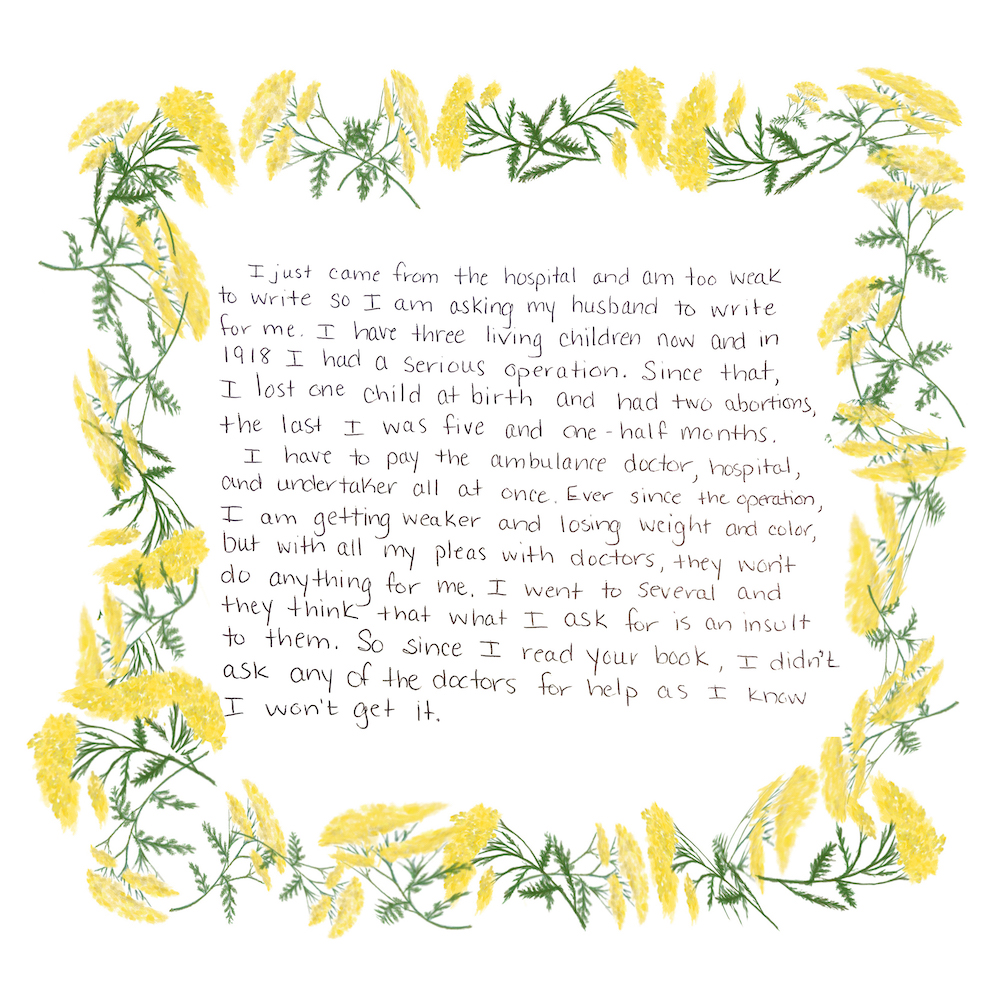
With All My Pleas With Doctors They Won’t Do Anything 2023 from the installation Unplanned Parenthood by Michelle Hartney
11×11” archival inkjet print.
Unplanned Parenthood is a mixed media installation about the history of birth control and the role racism played in the fight for reproductive justice in the United States.
When students are robbed of a comprehensive health education, it will become that much harder to navigate health concerns later in life and that can create a cascade of problems in other areas of their life as well.
Q: More broadly, art and politics frequently intersect. Why is art such a powerful tool of political dissent?
NOBLES: Art is a powerful tool of political dissent because it creates space for people to experience themselves and others without judgment. You’re allowed to be a little bit crazy and wild, and people love that; it activates your brain in a different way. My work, for example, utilizes abstraction to create conversation about reproductive advocacy. You can look at the sculpture and relate it to your own life experiences and feelings, without knowing the entire meaning. Or you can read about the work, watch the films, and create an interpretation from there. It’s all how you want to engage, there’s no rules.
Q: This is not the first time artistic expression has been censored. We’ve seen it across the country with book bans, anti-drag legislation, and more. How does censorship affect our ability to tell diverse stories? How does it make ordinary experiences into something shameful or “taboo”?
HARTNEY: Censorship severs the important conversations that need to be out there in the world, and that’s only going to delay progress at a time we can’t afford to delay any progress. It’s also such a distraction. All these efforts to censor materials distract us from the work we’re doing, or make us too exhausted to keep doing the work, and that’s what conservatives want.
MAJKUT: When stories, facts, and art are censored and forbidden from being expressed, those American values start to disappear and the foundation of this country starts to crumble. Ignoring, silencing, or rewriting the stories of people are the acts of authoritative dictatorships. It breeds an unwillingness to recognize, to acknowledge, or to fix unhealthy actions and behaviors. That culture breeds hate, distrust, bias and lacks empathy, generosity, and kindness.
Published March 21, 2023 at 08:26PM
via ACLU https://ift.tt/kxNt0Wl
